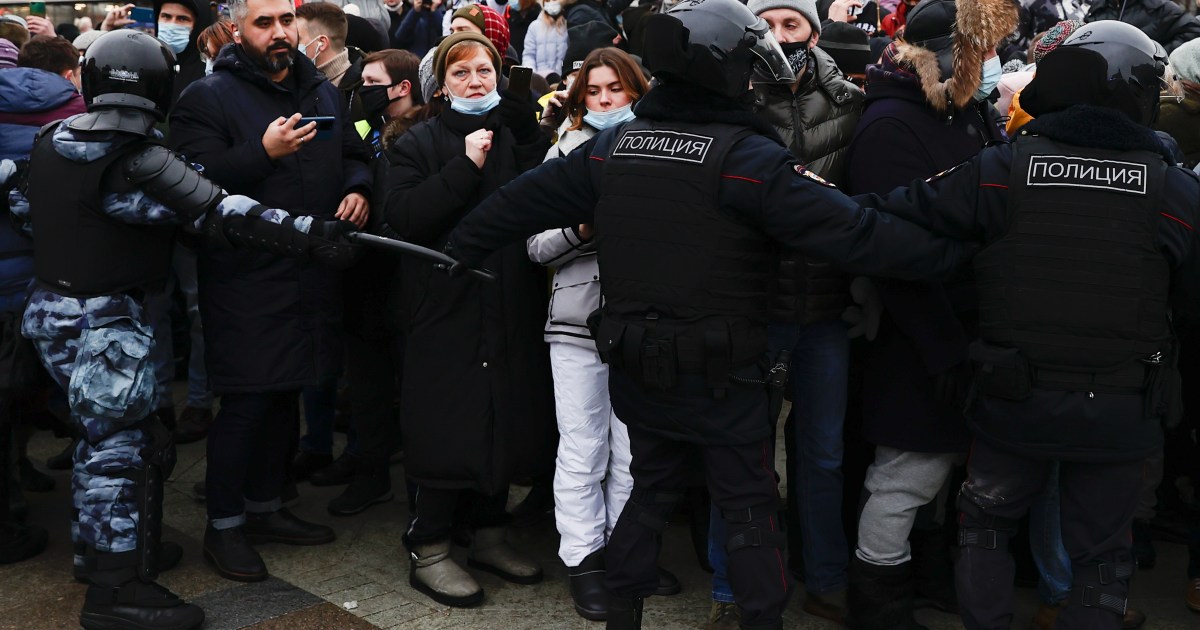The Russian Foreign Ministry summoned Washington's ambassador to Moscow, John Sullivan, and lodged a strong protest against the embassy publishing maps of the demonstrations that took place in Russia the day before Saturday to protest the arrest of prominent dissident Alexei Navalny, while European Union foreign ministers discussed Monday a response to Navalny’s arrest and the crackdown on demonstrators .
The Al-Jazeera correspondent in Moscow reported that the Russian Foreign Ministry protested to the Washington ambassador in Moscow about his country's support for the demonstrations that Russia describes as irregular, and Russian President Vladimir Putin said about them as dangerous.
Moscow also considered the US embassy’s publication of the demonstrations ’maps and the US State Department’s statement in support of them as a blatant interference in Russia’s internal affairs.
Before the demonstrations the day before yesterday, the US embassy in Moscow issued a warning to its American citizens to avoid protests, and indicated the areas in which the protesters intend to gather.
Communication platforms
The Russian Foreign Ministry confirmed that it was analyzing the interference of the US Internet platforms in Russia's internal affairs.
The Russian Information Agency reported that the Russian Foreign Ministry accused Facebook and other major US social media companies of not taking the necessary measures to monitor what Moscow said were false posts related to the protests in Russia.
Russian police arrested more than 3,000 protesters, and resorted to force to disperse marches across the country on Saturday, after tens of thousands of protesters ignored the bitter cold and police warnings to demand Navalny's release.
And Anadolu Agency reported that the Russian judiciary today issued administrative prison sentences ranging from one to 13 days, and fines for participants in the demonstrations that took place in Russian cities without permission from the authorities, and the judiciary directed charges against opponents, including organizing demonstrations without permission from the authorities, and resisting forces Security.
Other demonstrations
In a related context, Leonid Volkov, the imprisoned opposition ally, called Navalny, today, Monday, for new protests in various Russian cities after 5 days (next Saturday), to demand the release of Navalny, who was imprisoned for 30 days for allegedly violating a conditional amnesty.
Tens of thousands of participants in the demonstrations in Russia in support of the opposition Alexei Navalny, and more than 3 thousand demonstrators were arrested during protests in 60 cities!
- The Russian protesters are calling on Russian President Vladimir Putin to release the opposition Alexei Navalny!
pic.twitter.com/y6cl1h4Vld
- Freedom News (@ 7reya) January 24, 2021
Navalny faces a prison sentence of 3 and a half years, for violating the conditions of judicial control imposed on him, as part of a previous ruling while he was recovering in Germany from alleged poisoning with the nerve gas "Novichok". The Russian opposition accused Moscow of being behind his poisoning.
On the other hand, the European Union foreign ministers will discuss today their response to the arrest of Navalny, the most prominent critic of Russian President Putin.
European diplomats told Agence France-Presse that the ministers of the European Union do not expect to impose sanctions against Russia today, despite the efforts of some capitals to take a tough stance towards the arrest of Navalny and the suppression of protests.
European Union officials are expected to wait for Navalny to appear in Russian court early next month, to see if the Kremlin will put him behind bars for a long time.
The French Press Agency quoted diplomatic sources as saying that the European Union foreign ministers decided to send the Commissioner for Foreign Affairs of the European Union Josep Borrell to Moscow early next month, to carry a clear message to the Russian authorities.

